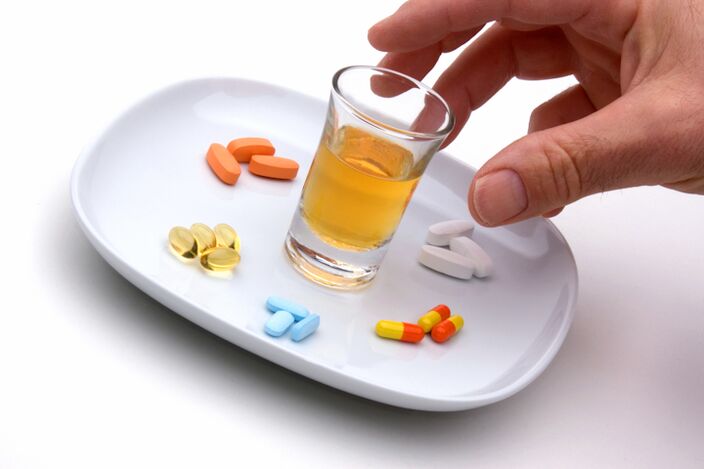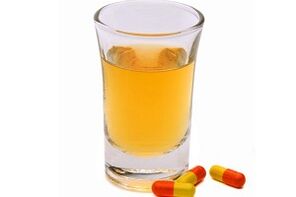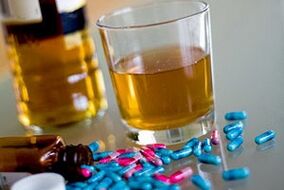Antibiotics, although there are many contraindications and various side effects, are indispensable drugs that have saved more than one life. Because only antibiotics can destroy the bacteria in the body that cause dangerous diseases.

In the days before these drugs were invented, many people died from bacterial infections. Many diseases are considered incurable due to the lack of such drugs.
Antibiotics should not be taken without a doctor's prescription and it is very important to follow the rules of their intake. In addition, you need to know that antibiotics are not compatible with alcohol. Answers to all questions related to antibiotic intake are found in this article.
Regulation of antibiotics
The most important rule for taking antibiotics is to use them only in cases where it is impossible to do without the drug. The indication for use is the symptoms of an acute bacterial infection, which the body cannot deal with on its own. To obtain the desired therapeutic effect, the intake of antibiotics should not be done indiscriminately.
You must follow the instructions below:
- You cannot give antibiotics yourself if there is no medical education. Only a doctor can determine the cause of the disease - virus or bacteria. With a viral infection, antibiotics cannot help; on the contrary, it can exacerbate the course of the disease;
- You cannot stop a prescribed treatment if you feel better. Recurrence of the disease may occur;
- Do not change the dose of antibiotics during treatment. Dose decreases threaten that bacteria will develop resistance to the drug, and the increase is fraught with side effects or overdose
- You should not drink antibiotics with tea, juice, and especially milk, otherwise taking the drug will not be useful. Dairy products, milk and fermentation are not suitable for antibiotics, it reduces the effect of the drug. You can drink the medicine only with water, about 0. 5-1 glasses;
- You should not take antibiotics at any time. It is important to follow the medication instructions and use the medication as described, that is: before, during or after meals. In addition, it is important to observe the frequency of administration (1 time in 24 hours, 2 times in 12 hours, 3 times in 8 hours, and so on), to establish the desired concentration of antibiotics in the body;
- Do not combine antibiotic intake with physical activity;
- You should not drink alcohol while taking antibiotics.

Before prescribing antibiotics, it is important to tell your doctor about the following:
- medications currently being taken;
- pregnancy or lactation;
- kidney or liver disease;
- diabetes.
And also if observed earlier:
- occurrence of side effects;
- development of allergic reactions;
- recent use of antimicrobial agents.
When can I drink alcohol after finishing antibiotics?
Different antibiotics have different active ingredients. Therefore, each drug has its own elimination conditions from the body. In one case, this is a short period, and alcohol can be drunk the next day, and in another, abstinence from drinking alcohol is required for 7 days.
The required information, as a rule, is indicated by the manufacturer in the explanation for its preparation. If not present, it is better to wait 10 days. In addition, if the patient has problems with the kidneys or liver, this period is at least doubled.
How long after alcohol can you take antibiotics?
Alcohol is completely eliminated from the body 21 hours after the last intake. After this period, you can take the prescribed antibiotics. However, it is better to reduce alcohol consumption as much as possible if you take a course.
Causes of alcohol and antibiotic incompatibility
Despite the fact that the intake of antibiotics significantly burdens the kidneys and liver, and its intake with alcohol will only worsen the condition, because ethanol slows down the work of the excretory system, there are other important reasons for incompatibility.
All substances that enter the human body begin to disintegrate until only its original parts remain. This is also true with alcohol and antibiotics. The danger of co -administration is that antibiotic molecules are similar to alcohol molecules. The body cannot recognize it properly, which leads to failure.
Alcohol is perceived by the body as a drug, which leads to the fact that alcohol molecules are processed improperly by the body.
Consequences of not adhering to the rules of antibiotic intake
If there is a violation of the rules of antibiotic intake, as well as with the wrong choice of medication or the wrong treatment regimen, unwanted side effects often occur.
This includes:
- Dysbacteriosis. It is caused by an imbalance between the healthy microflora of the body and the pathogen, which occurs at a time when pathogenic bacteria begin to quantitatively outnumber the bacteria that perform the body’s protective function. Dysbacteriosis manifests itself in the form of candidiasis or recurrent diarrhea.
- Allergic reactions. Individual intolerance to drug components plays an important role here. Allergic reactions vary, including irreversible reactions.
- Antibiotic resistance to bacteria. Pathogenic microorganisms can adapt to the active ingredient of antibiotics, one can only loosen the "grip". They continue their reproduction, and the disease continues.
Only a serious attitude to taking antibiotics will provide the necessary therapeutic effect.
What antibiotics are strictly prohibited with alcoholic beverages?
There are antibiotics that are strictly forbidden to be consumed in conjunction with beverages that contain alcohol. This information, without fail, is indicated in the annotations to the drug product, in addition, the doctor responsible for prescribing antibiotics must warn the patient about this.
These medications include the following antibiotics:
- Tetracycline group. Preparations based on it are often used in medicine, have a broad spectrum of action;
- Chloramphenicol group. This group of drugs often causes side effects, and together with alcohol can increase the toxic effects of drugs;
- Group of lincosamides. When taken simultaneously with beverages containing alcohol, it has a negative effect on the liver and central nervous system;
- Aminooglycoside group. This group of drugs is the strongest among antibiotics. Poor compatibility with other drugs, not to mention alcohol
- Group of cephalosporins. Co -consumption of alcohol causes symptoms of severe body intoxication, which results in a strong deterioration of well -being;
- Macrolide groups. The combination of alcohol and antibiotics produces strong toxic effects on the liver and brain;
- Antibiotics used to treat tuberculosis;
- Antibiotics are used to treat leprosy.

Also in the pharmacological market there are drugs whose annotations do not contain information on interactions with alcohol.
The lack of information on combinations with alcohol in no way means that such combinations are allowed. There is no need to expose the body to unnecessary risks.
Possibly due to a combination of antibiotics and alcohol
There is no way to know in advance how a particular organism will respond to the simultaneous intake of fluids and antibiotics containing alcohol. Damage can be done to any part of the body.
However, there are the most common consequences:
- Severe allergic reactions;
- Unbearable headaches;
- Dizziness;
- Hard to breath
- Chest pain, depressing character;
- A sudden rise or fall in blood pressure;
- Blurring the mind;
- Excessive sweating;
- Nausea or vomiting;
- Liver damage;
- Severe state of intoxication and intoxication;
- The need to repeat the course of antibiotics. Alcohol will reduce or destroy the effects of the drug.
The consequences can be even more depressing, it all depends on the individual and his or her health. The negative consequence is always the suffering of the organism, in whole or in part. Negative effects can be easily avoided by simply eliminating alcohol along with antibiotics.
It is important to note that currently, through clinical studies, only a fraction of all antibiotics have been proven to be incompatible with alcohol. The rest of the drugs remain dubious or not fully understood.
One must understand the onset of possible consequences, by concentrating on drugs that have already been studied incompatible with ethanol. Responsibility for your health should take precedence over drinking -related living conditions.
And to get the best treatment results, you should abandon alcohol, whatever, even the weakest.
























